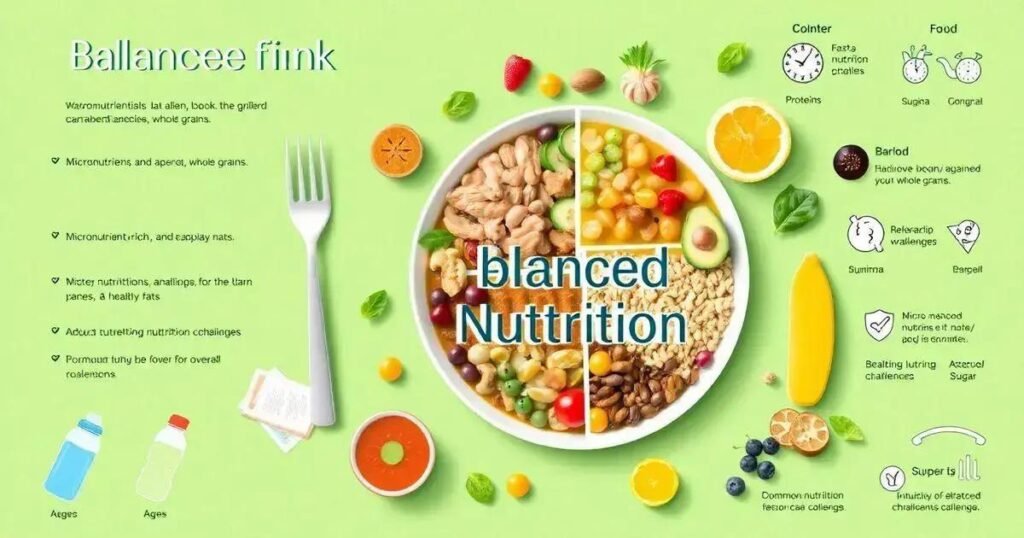Are you tired of feeling sluggish and run down, despite your best efforts to eat a healthy diet? The key to unlocking optimal health and wellbeing may lie in achieving balanced nutrition.
By understanding the importance of macronutrients, micronutrients, and the challenges that come with balancing your diet, you can take control of your health and transform your life.
Defining Balanced Nutrition
When it comes to achieving balanced nutrition, it’s essential to understand the concept itself.
Balanced nutrition refers to a state where the body is receiving the necessary nutrients, vitamins, and minerals to function optimally. This is achieved by consuming a combination of macronutrients, including carbohydrates, proteins, and fats, as well as micronutrients like vitamins and minerals.
A balanced diet should provide the body with the necessary fuel to maintain optimal health, support growth and development, and prevent chronic diseases.
The Importance of Macronutrients

The three main categories of macronutrients are carbohydrates, proteins, and fats.
Carbohydrates provide energy for the body, while proteins are essential for building and repairing tissues.
Fats play a crucial role in absorbing fat-soluble vitamins and providing energy.
A balanced diet should include a mix of these macronutrients to ensure optimal health.
For example, a healthy breakfast might include whole-grain toast with avocado and scrambled eggs, providing a balance of complex carbohydrates, healthy fats, and protein.
By understanding the importance of macronutrients, individuals can make informed decisions about their diet and optimize their nutrition.
Balanced Nutrition for Different Stages of Life
Balanced nutrition is essential at every stage of life, from childhood to old age.
During childhood, a balanced diet helps support growth and development, while in adulthood, it can help prevent chronic diseases and maintain optimal health.
As people age, their nutritional needs change, and a balanced diet becomes increasingly important for maintaining mobility, cognitive function, and overall well-being.
A balanced diet during pregnancy is crucial for the health and development of the fetus, while in old age, it can help prevent age-related diseases and maintain independence.
By understanding the nutritional needs at each stage of life, individuals can make informed decisions about their diet and optimize their nutrition.
The Role of Micronutrients

Micronutrients, such as vitamins and minerals, play a crucial role in maintaining optimal health.
These nutrients are essential for the proper functioning of enzymes, hormones, and other biological processes.
Vitamin D, for example, is essential for bone health, while iron is necessary for healthy red blood cells.
Micronutrients can be found in a variety of foods, including fruits, vegetables, whole grains, and lean proteins.
A diet rich in micronutrients can help prevent deficiencies and reduce the risk of chronic diseases.
By understanding the role of micronutrients in the body, individuals can make informed decisions about their diet and optimize their nutrition.
Common Challenges to Balancing Nutrition
Despite the importance of balanced nutrition, many people face challenges in achieving it.
One common challenge is a lack of knowledge about nutrition and healthy eating habits.
Others may struggle with food allergies or intolerances, making it difficult to find suitable foods.
Busy lifestyles and sedentary jobs can also make it hard to prioritize nutrition.
Additionally, social and cultural factors can influence food choices and make it difficult to adopt healthy habits.
By understanding the common challenges to balanced nutrition, individuals can take steps to overcome them and achieve optimal health.
Practical Tips for Achieving Balanced Nutrition

To achieve balanced nutrition, individuals can follow several practical tips.
Firstly, they should prioritize whole foods, such as fruits, vegetables, whole grains, and lean proteins, over processed and packaged foods.
Secondly, they should pay attention to portion sizes and control their calorie intake.
Thirdly, they should stay hydrated by drinking plenty of water throughout the day.
Additionally, they can consider keeping a food diary to track their eating habits and identify areas for improvement.
By following these practical tips, individuals can make informed decisions about their diet and achieve balanced nutrition.
FAQ – Frequently Asked Questions about Balanced Nutrition
What is the importance of macronutrients in a balanced diet?
Macronutrients, such as carbohydrates, proteins, and fats, are essential for providing energy, building and repairing tissues, and supporting overall health.
How can I achieve balanced nutrition for different stages of life?
Balanced nutrition is essential at every stage of life, from childhood to old age. A diet rich in whole foods, fruits, vegetables, whole grains, and lean proteins can help support growth and development, prevent chronic diseases, and maintain optimal health.
What is the role of micronutrients in a balanced diet?
Micronutrients, such as vitamins and minerals, play a crucial role in maintaining optimal health. They help regulate biological processes, support immune function, and maintain overall health.
What are some common challenges to balancing nutrition?
Common challenges to balancing nutrition include a lack of knowledge about nutrition, food allergies or intolerances, busy lifestyles, and social and cultural factors that influence food choices.
What are some practical tips for achieving balanced nutrition?
Practical tips for achieving balanced nutrition include prioritizing whole foods, paying attention to portion sizes, staying hydrated, and tracking eating habits.



